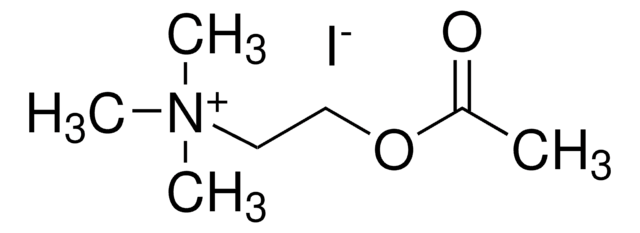A5626
Acetylthiocholine chloride
≥99% (TLC), powder
Synonym(s):
(2-Mercaptoethyl)trimethylammonium chloride acetate
Sign Into View Organizational & Contract Pricing
All Photos(1)
About This Item
Linear Formula:
CH3COSCH2CH2N(CH3)3Cl
CAS Number:
Molecular Weight:
197.73
EC Number:
MDL number:
UNSPSC Code:
12352204
PubChem Substance ID:
NACRES:
NA.83
Recommended Products
Application
Acetylthiocholine chloride has been used to determine the acetylcholine esterase activity of semen exosomes (SE). It has also been used as a substrate for acetylcholine esterase in microcalorimetric study of its kinetic parameters.
Biochem/physiol Actions
Acetylcholinesterase (AChE) enzyme plays an important physiological role in the neurotransmission process.
Acetylcholinesterase substrate and nicotinic acetylcholine receptor agonist.
Signal Word
Danger
Hazard Statements
Precautionary Statements
Hazard Classifications
Eye Dam. 1
Storage Class Code
11 - Combustible Solids
WGK
WGK 3
Flash Point(F)
Not applicable
Flash Point(C)
Not applicable
Certificates of Analysis (COA)
Search for Certificates of Analysis (COA) by entering the products Lot/Batch Number. Lot and Batch Numbers can be found on a product’s label following the words ‘Lot’ or ‘Batch’.
Already Own This Product?
Find documentation for the products that you have recently purchased in the Document Library.
Customers Also Viewed
Tanja Botić et al.
European journal of medicinal chemistry, 136, 294-304 (2017-05-16)
The brominated pyrroloiminoquinone alkaloids discorhabdins B, L and G and 3-dihydro-7,8- dehydrodiscorhabdin C, isolated from methanol extracts of two specimens of Latrunculia sp. sponges collected near the Antarctic Peninsula, are here demonstrated for the first time to be reversible competitive
Isolation of Exosomes from Semen for in vitro Uptake and HIV-1 Infection Assays
Madison MN, et al.
Bio-protocol, 7(7) (2017)
Jerneja Kladnik et al.
International journal of molecular sciences, 21(16) (2020-08-13)
The increasing number of Alzheimer's disease (AD) cases requires the development of new improved drug candidates, possessing the ability of more efficient treatment as well as less unwanted side effects. Cholinesterase enzymes are highly associated with the development of AD
Konstantin A Petrov et al.
Scientific reports, 8(1), 304-304 (2018-01-13)
Non-selective inhibitors of cholinesterases (ChEs) are clinically used for treatment of myasthenia gravis (MG). While being generally safe, they cause numerous adverse effects including induction of hyperactivity of urinary bladder and intestines affecting quality of patients life. In this study
Lindon W K Moodie et al.
Organic & biomolecular chemistry, 14(47), 11220-11229 (2016-11-15)
The marine secondary metabolite stryphnusin (1) was isolated from the boreal sponge Stryphnus fortis, collected off the Norwegian coast. Given its resemblance to other natural acetylcholinesterase antagonists, it was evaluated against electric eel acetylcholinesterase and displayed inhibitory activity. A library
Our team of scientists has experience in all areas of research including Life Science, Material Science, Chemical Synthesis, Chromatography, Analytical and many others.
Contact Technical Service










